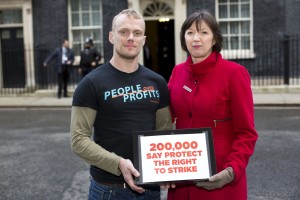
Trade unions in the UK are facing an historic attack on the right to strike. Without EU membership key legal protections would be at risk under an anti-union government. Photo © Jess Hurd, Flickr
 Judy McKnight is the former general secretary of the Napo, the trade union and professional association for family court and probation staff, from 1993 until her retirement in 2008. She now sits on the EU Economic & Social Committee – a tripartite body of employers, workers & other civil society groups – as the lead UK worker representative. This is the text of her speech to the meeting last week.
Judy McKnight is the former general secretary of the Napo, the trade union and professional association for family court and probation staff, from 1993 until her retirement in 2008. She now sits on the EU Economic & Social Committee – a tripartite body of employers, workers & other civil society groups – as the lead UK worker representative. This is the text of her speech to the meeting last week.
I welcome this opportunity to make a brief statement from the perspective of a British trade union member in the EESC, in the context of negotiations currently taking place under the Dutch Presidency, on a new EU settlement for the UK.
I think I speak for all European trade unions, including UK trade unions, in saying that our vision for reform in Europe, is not the same as Prime Minister Cameron’s. His agenda does not address the legitimate aspirations of EU citizens, for decent jobs, and good wages, for fairness at work and sustainable growth.
It was heartening to hear the (Dutch) Secretary of States commitment this morning to seek to tackle exploitation, and a commitment to address the ‘fair’ as well as the ‘free’ side of the movement of labour.
David Cameron’s agenda, however, does not address low pay and precarious work, and the problem in the UK, of employers who undercut pay by exploiting workers from elsewhere in the EU, as a source of cheap labour. Making these workers even poorer by cutting their benefits, will not make other workers better off.
His agenda, does not recognise that public services in the UK, are under pressure, not because workers from elsewhere in the EU, are attracted to countries such as the UK to work, but because of his Government’s policies to make crippling cuts to public sector budgets.
To be clear, David Cameron’s agenda is not our agenda.
It is my belief, and almost certainly that of the majority of trade unions in the UK, that our future should continue to be part of the EU, part of a Europe that is based on the principles of solidarity.
 Along with other European Trade unions, we want to be working with the Council, the Commission and employers, to promote greener and fairer growth, by boosting investment, productivity and living standards, and by promoting social and employment rights, including fair terms for Labour mobility, not by joining in a race to the bottom.
Along with other European Trade unions, we want to be working with the Council, the Commission and employers, to promote greener and fairer growth, by boosting investment, productivity and living standards, and by promoting social and employment rights, including fair terms for Labour mobility, not by joining in a race to the bottom.
It is because of that vision for Europe, not David Cameron’s, which I would not deign to call a vision, that in the forthcoming Referendum in the UK on EU membership, I for one, will be voting to say that the UK should remain, and be a central player, in the European Union.
22nd February 2016
